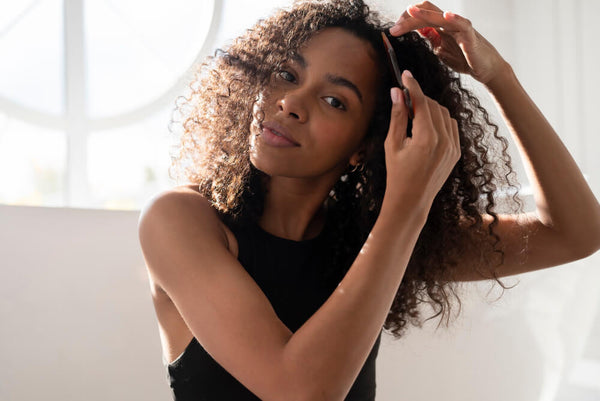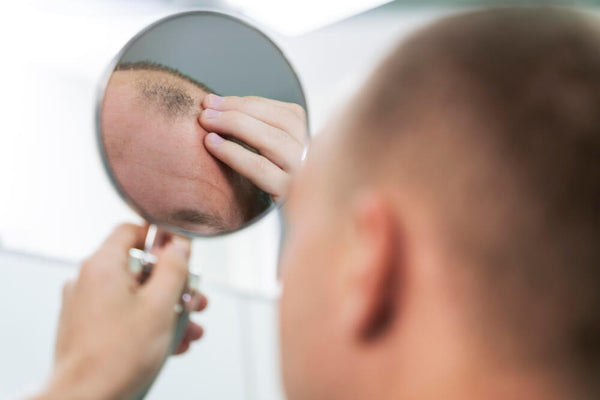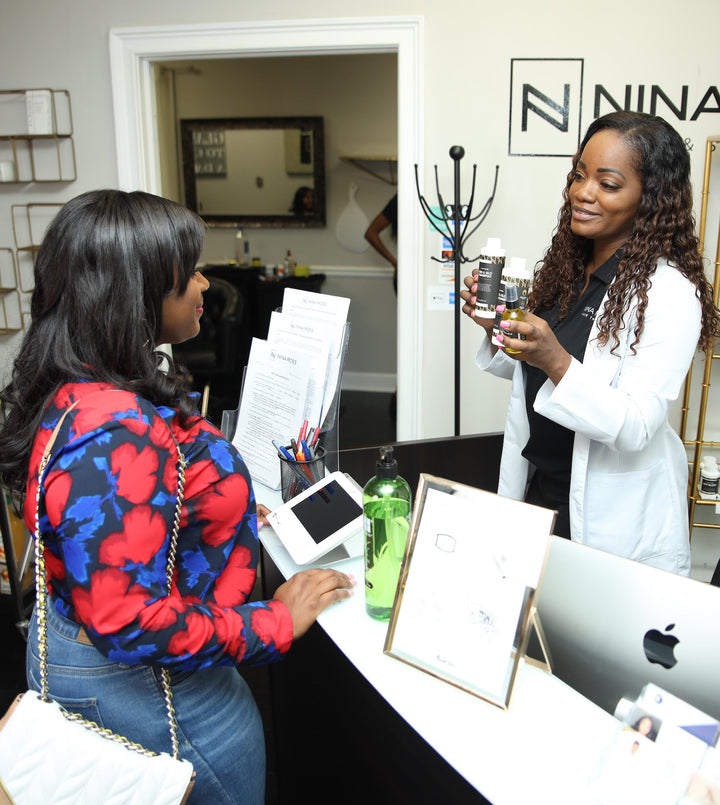I need you to think about the last time you took down your braids or removed your wig. Remember that relief when the tension finally released? That soreness along your hairline? The little bumps that appeared where the braids were tightest?
That wasn't just "normal styling discomfort." That was your hair follicles screaming for help.
At our Atlanta clinic, I see this story every single day. Women who've worn braids, weaves, and ponytails for years—styles that made them feel beautiful and put-together—only to realize they've been slowly sacrificing their edges to the tension gods.
The 5 Warning Signs Most Women Ignore
Traction alopecia doesn't happen overnight. It's a slow creep. Here's what to watch for:
1. The "Soreness That Lingers"
Your scalp shouldn't still hurt hours after styling. That persistent tenderness means you've crossed from "snug" to "damaging."
2. The Little Bumps Along Your Hairline
Those tiny pimple-like bumps? That's folliculitis—inflammation caused by constant pulling. Left untreated, it can lead to permanent scarring.
3. The "Baby Hairs" That Never Grow Up
When your edges start looking wispy and broken instead of full, that's not new growth—that's damage. Healthy baby hairs eventually become adult hairs. Damaged ones stay stunted.
4. The Ponytail That's Getting Skinnier
Measure your ponytail circumference every few months. If it's shrinking, you're losing density to traction damage.
5. The Redness You Can't Explain
Inflammation shows up as redness on lighter skin and darker patches on melanated skin. Either way, it's a warning sign.
Why "Just Loosen Your Styles" Isn't Enough Advice
I know—telling a Black woman to stop wearing braids is like telling her to change her identity. Our styles are cultural, convenient, and beautiful. The answer isn't abandonment—it's adaptation.
The real problem isn't the style itself—it's the combination of tension and time. That "cute ache" when you first get braids? That's damage happening in real-time.
Our Approach: Healing What's Been Damaged
At Nina Ross Hair Therapy, we don't just tell you to wear your hair loose (though that helps). We actually repair the damage while helping you find smarter styling solutions.
For Early Stage Damage (Still Reversible):
-
Scalp detox treatments to reduce inflammation
-
Medical-grade growth serums to stimulate dormant follicles
-
PRP therapy to boost blood flow to damaged areas
-
Gentle massage techniques you can do at home
For Advanced Damage (Scarring Present):
-
Exosome therapy to regenerate damaged tissue
-
Customized edge rehabilitation protocols
-
Nutritional support to rebuild from within
-
Styling alternatives that give tension relief without sacrificing your look
What You Can Start Doing Tonight
While serious damage needs professional help, here's what actually helps right now:
Wash MORE Often: Buildup increases tension and inflammation. Weekly washing is non-negotiable.
The Two-Week Rule: No style should stay in longer than 6-8 weeks max. Two weeks between styles is ideal.
Sleep Protection: Silk bonnets aren't optional—they reduce friction that weakens already stressed hair.
Listen to Your Scalp: If it hurts, it's too tight. Period.
When It's Time to Panic (And Come See Us)
Most traction alopecia is reversible if caught early. But come see us immediately if:
-
You're seeing actual smooth, shiny patches where hair used to be (that's scarring)
-
The hair loss continues even after you've stopped wearing tight styles
-
You're developing headaches from the tension
-
You've noticed the problem for more than 6 months
Your Edges Don't Have to Be the Price of Beauty
I've helped women regrow edges they thought were gone forever. The key is early intervention and the right treatment approach. Your signature style shouldn't cost you your hairline.
If you're noticing thinning and want to reverse the damage before it's permanent, book your Hair Therapy Evaluation with us today for just $99. Let's preserve the hair you have and regrow what you've lost.














